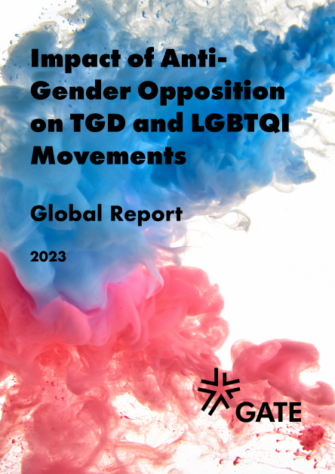Conservative movements and those groups who oppose the equality of trans and gender diverse (TGD) individuals, or equality in general, are not new phenomena. However, in the past two decades, an oppositional movement has become more organized, with global reach and an interconnected network, which brings together actors that otherwise have divergent political stances and agendas, ranging from ultraconservative to seemingly socially progressive. This oppositional movement has become known as the anti-gender (AG) movement.
GATE’s reports reveal some notable global and regional trends about how the anti-gender movement is impacting the equality of trans, gender diverse (TGD) and wider LGBTQI communities globally, extracted from the responses to our survey.
What is the anti-gender movement?
The anti-gender movement is a group of individuals and organizations who oppose gender theory and seek to maintain traditional gender roles and identities. They believe that there are only two distinct and unchangeable genders, male and female, and that any attempt to challenge these binaries is a threat to traditional values and societal order. These movements often mobilize against trans and gender diverse people, as well as the wider LGBTQI community, by promoting discriminatory and exclusionary policies and laws. They may also engage in hate speech, harassment, and violence against these groups.
Trans and gender diverse people are particularly targeted by the anti-gender movement because they challenge the traditional gender binary and the rigid gender roles that come with it. The movement seeks to limit their rights and freedoms, including access to healthcare, education, and employment and perpetuates harmful stereotypes and myths about their identities.
A global research report into the impact of the anti-gender movement
The Impact of Anti-Gender Opposition on TGD and LGBTQI Movements: Global Report highlights the main topics of discussion used by anti-gender actors, the political ideological stances of these actors, and the impact of anti-gender opposition on the equality of trans, gender diverse (TGD) and wider LGBTQI communities.
This report also sheds light on the biggest challenges to counteracting anti-gender mobilization, including the lack of political will and lack of proper legislation. A key finding was uncovering the multiple ways that anti-gender actors are increasing their ability to use deceptive and fear-mongering communication tactics to gain more public support, through increased political connections, thus expanding their ability to impact government policies. The report highlights the damaging impact of these communication strategies in affecting political change that negatively impacts the human rights of TGD and LGBTQI communities across the globe.
The report concludes by emphasizing the alarming nature of anti-gender groups’ deliberate dissemination of false and harmful information, the role of traditional and social media in enabling anti-gender narratives and actions, and the resulting violence ultimately leading to a worsening human rights situation for TGD and wider LGBTQI communities globally.






